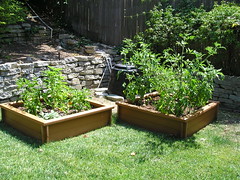The only things hanging in there are the carrots, some onions and a couple of broccoli plants. The seedling seem to be healthy, but only the carrots appear to have grown in the last few weeks. The broccoli seems to be almost in stasis.
My gardening class last Saturday was really interesting; one of the most interesting so far. It was on pest control, with the emphasis on organic methods, or even better, no methods at all. If you garden organically, you soon learn to accept a certain amount of crop loss to occur. But if your garden is essentially healthy and diverse, our professor pointed out, you will have an equal number of predator species to balance out the pest.
I spent much of the rest of the day thinking about this, picturing a little African Savannah scene in my yard, with herds of aphids crossing a great plain of a leaf, while predators like Lace Wings, Wasps and Ladybug larvae lie in wait for them. Here are some of the fascinating things I learned.
*The time in a ladybug's life cycle when they eat the most aphids is actually the larval period. Once they become adults with spots and wings, they mostly are interested in nectar and don't eat many aphids. So those little containers of ladybugs you get at the garden store are of dubious value. By the time they get settled in your garden and lay eggs that hatch, the aphids or whatever will have already gone through your plants.
 However, if there is food for the adults (in the form of flowering herbs like thyme and other small flowers), they will hopefully stick around and lay some eggs so the next generation of predators are born. The problem is, if you saw a ladybug larva, your first reaction would be "oh my god KILL it!" So to help, I've include this picture.
However, if there is food for the adults (in the form of flowering herbs like thyme and other small flowers), they will hopefully stick around and lay some eggs so the next generation of predators are born. The problem is, if you saw a ladybug larva, your first reaction would be "oh my god KILL it!" So to help, I've include this picture. * Did you know that ants actually tend flocks of aphids like humans tend cattle? They feed on the fecal matter aphids create (called "honeydew") and will fight off aphid predators like ladybugs in an effort to protect "their herd."
* When plants are attacked by a pest like aphids or thrips or caterpillars, the plant will release a chemical scent that is particularly enticing to exactly that predator who will eat that pest. The plant can alter the scent in a thousand different ways to attract exactly the right predator species.
* This chemical scent also instantly alerts all the other plants to ready their defenses against attack, thereby making the other plants stronger and healthier. Did you know plants have such a sense of altruism and community?
The professor said one other thing that I thought was poignant. Pesticides (whether petroleum-based OR organic) tend to kill everything indiscriminately, including the all-important microbes in our soil. They might be effective in wiping out the pest, but they also destroy the predators and therefore disrupt that entire ecosystem. Therefore, the professor said, if you have to use pesticides to control the pests in your garden all the time, "you owe it to yourself and the planet to give up gardening."
Food for thought indeed! So, I've made it my mission this month to get outside and ID as many of the creepy-crawlies in my yard as I can. I'll report back on what I find.

No comments:
Post a Comment